八年级英语上册 Unit 7Section B(第三课时)导学案(无答案)(新版)人教新目标版
人教pep版八年级英语上册Unit7单元导学案

Unit 7 Will people have robots?第 1 课时 Section A (1a~2c)课时目标:知识目标: 1.娴熟掌握词汇:will, robot, everything, paper, use, fewer, less, pollution2.娴熟掌握以下句型:(1)There will be more pollution.(2) A: Will there be fewer trees?B: Yes, there will. /No, there won .’t(3)Kids will study at home on computers.(4)People will live to be 200 years old.(5) Really ? I don ’t think so技术目标: 1. 学会运用 there be 句型的一般未来时和 will 组成的一般未来时态对未来进行展望。
2. 学会运用“more, fewer, less比较”多少。
感情态度:学会踊跃的心态去面对未来的变化。
注意保护环境、爱惜地球。
课前预习 :Ⅰ. 保护自然环境,减少环境污染:近 50 年来,全世界天气变暖、臭氧层损坏、丛林植被锐减、生物多样性减少、酸雨和空气污染、土地沙漠化、水资源危机等一系列环境问题,令人们饱尝了环境恶化的结果。
遏制环境污染,实行可连续发展,成为此刻世界的最强呼吁。
联合国环境署确立今年世界环境日的主题为“冰川融化,结果堪忧”,旨在控制温室气体排放,以扭转全世界天气变暖的危险趋向。
Ⅱ . 请用 there be 句型描述我们的生活现状。
例句:There is a lot of pollution.Ⅲ. 一百年后,世界环境会有什么变化?人们的家居生活会是什么样的?发挥你的想象力,把它们用图画描述出来。
讲堂学习:Before listening1.全班进行议论,沟通展现课前准备Ⅱ的预习成就。
人教版英语八年级上册 Unit 7 Section B (导学案)
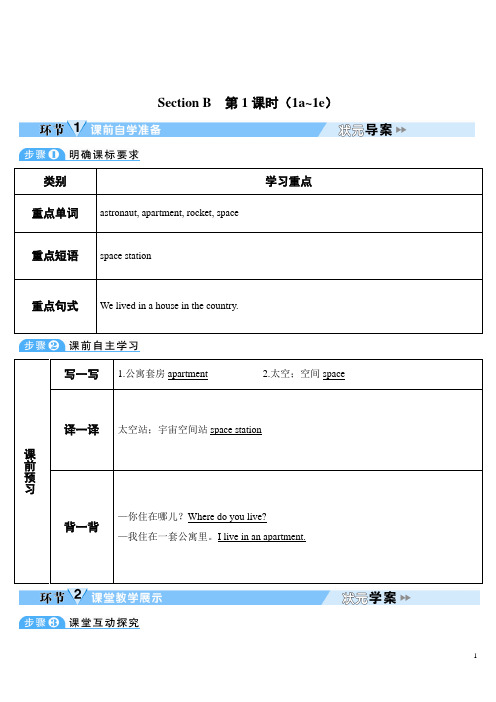
Section B 第1课时(1a~1e)类别学习重点重点单词astronaut, apartment, rocket, space重点短语space station重点句式We lived in a house in the country.课前预习写一写 1.公寓套房apartment 2.太空;空间space 译一译太空站;宇宙空间站space station背一背—你住在哪儿?Where do you live?—我住在一套公寓里。
I live in an apartment.2.apartmentapartment 作名词,意为“公寓套房”,通常是指一套出租的房间(出租给短期居住者,通常带家具)。
如:I live in a three room apartment.我住在一个有三个房间的公寓里。
【问题探究】1.My family live in a big apartment in a big city.2.Kids will go to school next Saturday.(改为否定句和一般疑问句)Kids won’t go to school next Saturday.Will kids go to school next Saturday?活学活练(A)1.I’ll live a space station one day.A .onB .in C. at D. for(B)2.Some scientists think robots will even be able to look humans in 25 50 years.A. like; forB. like; toC. to; from D .to; of(B)3.I will be astronaut in the future.A. aB. anC. theD. /(C)4.A place to live in space is a .A. houseB. ApartmentC. space stationD. space ship布置作业:教师引导学生课后完成本课时对应练习,并预习下一课时内容。
Section B 第3课时(导学案)

Section B 第3课时(导学案)Section B 第3课时(1a~1e)类别学习重点重点单词convenient, corner重点短语ask about, the corner of重点句式1.Can you tell me where there\'s a good place to eat?2.What kind of food do you like?课前预习写一写 1.便利的;方便的convenient 2.拐角;角落corner 译一译1.询问关于ask about2.……的拐角处the corner of背一背1.美术博物馆非常有趣。
The Fine Arts Museum is really interesting.2.你能告诉我哪里有吃饭的好地方吗?Can you tell me where there\'s a good place to eat?新课导入T:If you want to go to a restaurant,what kind of restaurant do you want to go to?What quality is important for a restaurant?S1:It must be clean.S2:The food there must be delicious.…教学反思本课时进一步通过听说训练让学生听懂游客所询问的信息,学会谈论所在城市的特色。
本节课的听力训练比较多,学生在学完Section A的基础上,听懂应该没问题,关键是在平时的听力训练中,教师要有意识地渗透一些听力技能,让学生养成一些好的听力习惯。
教学过程中老师的疑问:教师点评和总结:教学说明:通过和学生互动,导入“What qualities are important for each place?”这一话题。
人教版八年级英语上册导学案(全册)
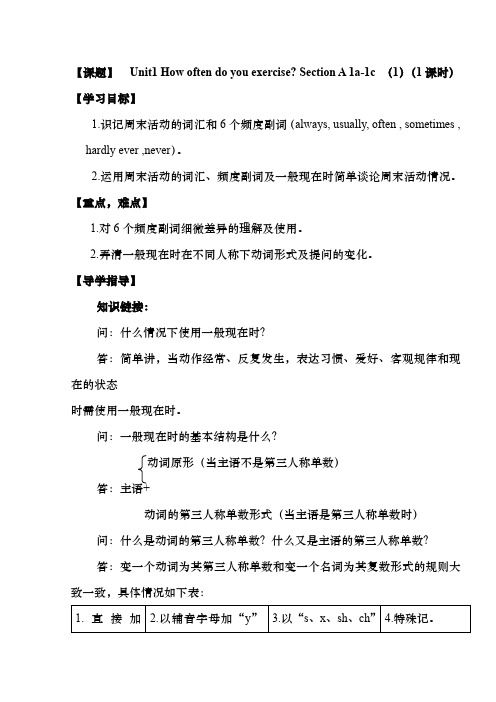
always从不,决不★
often几乎不☆(no star)
2.小组交流学习成果并讨论下列按频率高低顺序排列的表达是否正确(正确写T,错误写F)?若不正确,给出正确表达。
always>often>usually>sometimes>hardly ever>never.____
______>______>_____>______>_______>____.
5.Pair Work Show(展示对话)。
【课堂练习】
一、口译“自主学习一”所列词汇。
二、用所给词的适当形式填空。
1.Do you know Zhang Yining?Her ______(one)name is Yining and she surfs the Internet ______(one) a week.
【课题】Unit1 How often do you exercise? Section A1a-1c(1)(1课时)
【学习目标】
1.识记周末活动的词汇和6个频度副词(always, usually, often , sometimes , hardly ever ,never)。
2.运用周末活动的词汇、频度副词及一般现在时简单谈论周末活动情况。
知识链接:
一、将一个句子变为否定句的三个步骤:1、在要求变为否定句的句子中寻找be动词am、is、are、was、were,若有其中某个的话,在其后边加not即可(也可将其两个词缩写:is not=isn’t;are not=aren’t;was not=wasn’t;were not=weren’t)。2、若在要求变为否定句的句子中找不到am、is、are、was、were,就在其中寻找情态动词can、may、must、should、will、would、could、shall等,若有其中某个的话,就在其后加not即可(也可根据需要将其缩写:can not=can’t,must not=mustn’t, will not=won’t)。3、若在要求变为否定句的句子也找不到情态动词,就借助助动词do、does、did,第三人称单数借助does,不是第三人称单数借助do,一般过去时借助did,并在其后加not(分别可缩写成don’t、doesn’t、didn’t)后边的动词打回原形。
人教版英语八年级上册 Unit 3 Section B (导学案)

Section B第1课时(1a~1e)类别学习重点重点单词talented, truly, care, laugh重点短语care about,the same as重点句式1. I think a good friend makes me laugh.2. That 's not important for me.3. For me, a good friend likes to do the same things as me.4. Yes,and a good friend is talented in music,too.课前预习写一写1.有才能的;有才干的talented2.真正;确实truly3.在意;担忧;关心care4.笑;发笑laugh译一译 1.关心;在意care about 2.使某人发笑make sb. laugh 背一背1.我认为好朋友能让我发笑。
I think a good friend makes me laugh.2.好朋友还要有音乐方面的天赋。
A good friend is talented in music, too.新课导入T:What 's your friend like?S:He/She is taller than me./…T:What do you think are important in a friend?S:I think for a friend the important thing is to care about me or make me laugh./…活学活练1.He often makes me feel(feel)happy.2.We both have(两个都有)black eyes.3.He helps to bring out(展现出)the best in me.4.You can use the car as long as(只要)it is in good conditions.5.I have the same hairstyle(发型)as(介词)him,but my hobby is different from(介词)his.布置作业:教师引导学生课后完成本课时对应练习,并预习下一课时内容。
八年级上册英语Unit7导学案
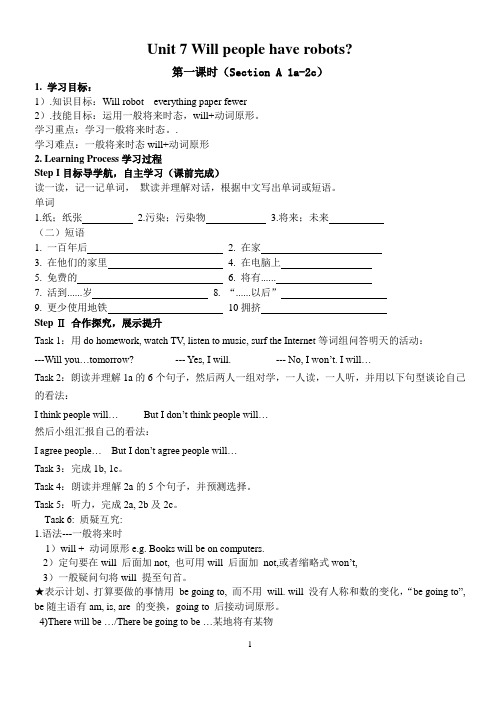
Unit 7 Will people have robots?第一课时(Section A 1a-2c)1. 学习目标:1).知识目标:Will robot everything paper fewer2).技能目标:运用一般将来时态,will+动词原形。
学习重点:学习一般将来时态。
.学习难点:一般将来时态will+动词原形2. Learning Process学习过程Step I目标导学航,自主学习(课前完成)读一读,记一记单词,默读并理解对话,根据中文写出单词或短语。
单词1.纸;纸张2.污染;污染物3.将来;未来(二)短语1. 一百年后2. 在家3. 在他们的家里4. 在电脑上5. 免费的6. 将有......7. 活到......岁8. “......以后”9. 更少使用地铁10拥挤Step Ⅱ合作探究,展示提升Task 1:用do homework, watch TV, listen to music, surf the Internet等词组问答明天的活动:---Will you…tomorrow?--- Yes, I will. --- No, I won’t. I will…Task 2:朗读并理解1a的6个句子,然后两人一组对学,一人读,一人听,并用以下句型谈论自己的看法:I think people will… But I don’t think people will…然后小组汇报自己的看法:I agree people… But I don’t agree people will…Task 3:完成1b, 1c。
Task 4:朗读并理解2a的5个句子,并预测选择。
Task 5:听力,完成2a, 2b及2c。
Task 6: 质疑互究:1.语法---一般将来时1)will + 动词原形e.g. Books will be on computers.2)定句要在will 后面加not, 也可用will 后面加not,或者缩略式won’t,3)一般疑问句将will 提至句首。
人教版八上英语unit7教案和导学案
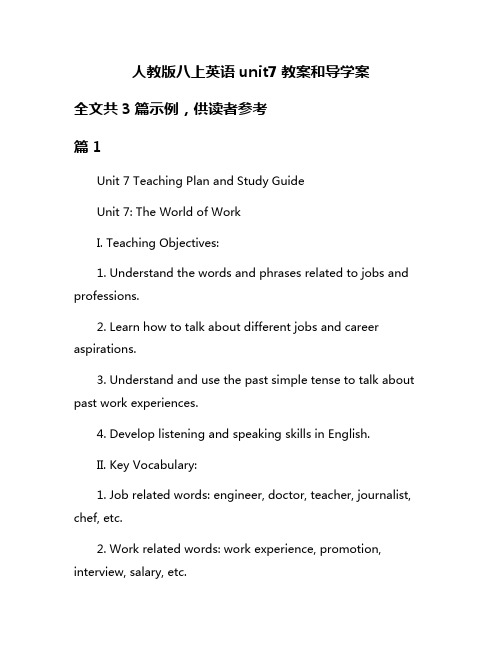
人教版八上英语unit7教案和导学案全文共3篇示例,供读者参考篇1Unit 7 Teaching Plan and Study GuideUnit 7: The World of WorkI. Teaching Objectives:1. Understand the words and phrases related to jobs and professions.2. Learn how to talk about different jobs and career aspirations.3. Understand and use the past simple tense to talk about past work experiences.4. Develop listening and speaking skills in English.II. Key Vocabulary:1. Job related words: engineer, doctor, teacher, journalist, chef, etc.2. Work related words: work experience, promotion, interview, salary, etc.3. Words related to career aspirations: dream job, career goals, etc.III. Teaching Activities:1. Warm-up (5 minutes):Start the lesson by asking students about their dream jobs and why they want to pursue those careers. This will introduce the topic of the unit and get students involved in the discussion.2. Vocabulary Introduction (10 minutes):Introduce the key vocabulary related to jobs, work, and career aspirations. Use pictures, flashcards, and real-life examples to help students understand and remember the words.3. Listening Task (15 minutes):Play a recording of a dialogue between two people talking about their work experiences. Ask students to listen carefully and answer questions about the dialogue. This will improve their listening skills and help them understand how to talk about past work experiences.4. Speaking Activity (20 minutes):Divide the class into pairs or small groups and ask them to discuss their own work experiences or talk about a job theyadmire. Encourage students to use the vocabulary they learned in the lesson and practice speaking in English.5. Grammar Practice (15 minutes):Introduce the past simple tense and explain how to use it to talk about past work experiences. Provide examples and additional exercises for students to practice forming sentences using the past simple tense.6. Role-Playing Activity (20 minutes):Assign roles to students and have them act out job interviews or conversations between a boss and an employee. This will encourage creative thinking and help students practice speaking and using the vocabulary and grammar they learned in the lesson.7. Wrap-up (5 minutes):Review the key points of the lesson and ask students to summarize what they learned. Encourage them to ask any questions they may have and provide feedback on their performance in the activities.IV. Study Guide:1. Review the vocabulary related to jobs, work, and career aspirations.2. Practice listening to dialogues and conversations in English to improve your listening skills.3. Practice using the past simple tense to talk about past work experiences.4. Engage in speaking activities to practice using the vocabulary and grammar you learned in the lesson.5. Participate in role-playing activities to improve your communication skills and fluency in English.By following this teaching plan and study guide, students will be able to enhance their English language skills and develop a better understanding of the world of work. With practice and perseverance, they can achieve their career goals and excel in their chosen professions.篇2Unit 7: How much are these socks?Teaching Goals:1. Understand and use the key vocabulary for different items of clothing.2. Be able to ask and answer questions about the price of items using "How much is/are...?"3. Practice using the quantifiers "a pair of", "a pack of", "a piece of" and "a bottle of".Teaching Procedures:Step 1: Warm-up (5 minutes)- Start the lesson by showing pictures of different items of clothing and asking students to identify them in English.- Review the names of the items of clothing and make sure all students understand the vocabulary.Step 2: Presentation (15 minutes)- Introduce the key vocabulary for this unit by showing flashcards of different items of clothing. Have students repeat after you and practice saying the words.- Teach the structure "How much is/are...?" and model some examples with the items of clothing. Encourage students to ask and answer questions about the price of different items in pairs.Step 3: Practice (20 minutes)- Divide students into pairs and give each pair a set of flashcards with pictures of items of clothing and their prices written on the back.- Students take turns flipping a card, asking their partner "How much is/are...?" and practicing responding with the correct price.- Monitor students as they practice and provide feedback on pronunciation and grammar.Step 4: Application (15 minutes)- Give each student a list of items they need to buy and a set budget.- Students must visit different "shops" (stations set up around the classroom) to inquire about the price of each item and decide what they can afford to buy within their budget.- Encourage students to negotiate with the "shopkeepers" and practice using the target language in a real-life scenario.Step 5: Extension Activities (10 minutes)- To further practice the target language, have students work in pairs to create a dialogue where they discuss prices and shopping for clothing.- Challenge students to come up with their own sentences using the quantifiers introduced in this unit ("a pair of", "a pack of", "a piece of", "a bottle of").Homework:- For homework, ask students to write a short paragraph describing their favorite item of clothing and its price. They should also include why they like it and where they bought it.Overall, this unit is designed to help students practice asking and answering questions about prices while expanding their vocabulary related to clothing items. By engaging in various activities and scenarios, students will develop their communication skills and gain confidence in using English in real-life situations.篇3Unit 7 Teaching Plan and Study GuideUnit 7: Where are you going?Teaching Aims:1. Enable students to understand and use vocabulary related to places in the city.2. Enable students to understand and use expressions related to giving directions.3. Improve students' listening, speaking, reading, and writing skills through various activities.Teaching Key Points:1. Vocabulary related to places in the city.2. Expressions related to giving directions.3. Listening and speaking skills.Teaching Difficult Points:1. Differentiation between prepositions of place.2. Using the target vocabulary and expressions in context.Teaching Methods:1. Task-based learning.2. Group work.3. Pair work.4. Role-play.5. Games.Teaching Aids:1. Multimedia resources.2. Flashcards.3. Worksheets.Teaching Procedures:Step 1: Warm-up (10 minutes)- Greet the students and review the vocabulary related to places in the city.- Show pictures of different places in the city and ask students to identify them.Step 2: Presentation (15 minutes)- Introduce the expressions related to giving directions using flashcards.- Practice pronunciation and usage of the expressions.Step 3: Listening (20 minutes)- Play a recording of a conversation between two people asking for and giving directions.- Ask students to listen and answer questions about the directions given.Step 4: Speaking (25 minutes)- Divide students into pairs and ask them to practice asking for and giving directions using the target expressions.- Monitor their conversations and provide feedback on pronunciation and usage.Step 5: Reading (15 minutes)- Distribute a reading passage about a tourist in the city asking for directions.- Ask students to read the passage and identify the places mentioned.Step 6: Writing (20 minutes)- Have students write a dialogue between two people asking for and giving directions in the city.- Provide examples and guidance on how to structure the dialogue.Step 7: Review and Homework (5 minutes)- Review the key vocabulary and expressions learned in the lesson.- Assign homework to practice using the target language in context.Study Guide:1. Review the vocabulary related to places in the city.2. Practice using the expressions related to giving directions in conversations with your classmates.3. Listen to recordings of conversations asking for and giving directions to improve your listening skills.4. Read passages about asking for directions in the city to improve your reading skills.5. Write dialogues between two people asking for and giving directions to practice using the target language.By following the teaching plan and study guide for Unit 7, students will have the opportunity to improve their English skills and become more confident in using vocabulary and expressions related to places in the city and giving directions. The variety of activities and methods used in the lesson will engage students and ensure they have a fun and effective learning experience.。
新人教版八年级英语上册Unit7 教案
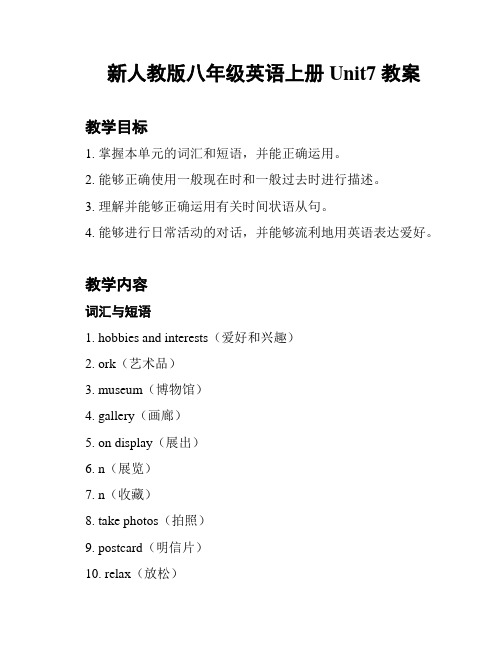
新人教版八年级英语上册Unit7 教案教学目标1. 掌握本单元的词汇和短语,并能正确运用。
2. 能够正确使用一般现在时和一般过去时进行描述。
3. 理解并能够正确运用有关时间状语从句。
4. 能够进行日常活动的对话,并能够流利地用英语表达爱好。
教学内容词汇与短语1. hobbies and interests(爱好和兴趣)2. ork(艺术品)3. museum(博物馆)4. gallery(画廊)5. on display(展出)6. n(展览)7. n(收藏)8. take photos(拍照)9. postcard(明信片)10. relax(放松)11. flight(航班)12. packed(拥挤的)13. mind(注意)14. secondhand(二手的)15. satisfied(满意的)语法1. 一般现在时:描述经常性、惯性的动作或状态。
2. 一般过去时:描述过去发生的动作或存在的状态。
3. 时间状语从句:用来表示不同时间点的事件或动作之间的关系。
教学步骤1. 导入(5分钟)- 通过展示一些图片引起学生对艺术的兴趣。
- 引导学生回忆一些艺术品或博物馆的名字。
2. 词汇与短语研究(10分钟)- 呈现并教授本单元的词汇与短语。
- 让学生进行拼读、理解和运用练。
3. 语法研究(10分钟)- 介绍一般现在时和一般过去时的用法。
- 提供相关的例句和练。
4. 练与交流(15分钟)- 学生以小组为单位进行交流,讨论自己的爱好和兴趣。
- 鼓励学生使用一般现在时进行描述,并提供必要的句子结构和词汇。
5. 时间状语从句(15分钟)- 讲解时间状语从句的概念和用法。
- 提供相关的例句和练。
6. 活动与应用(15分钟)- 学生分角色扮演,模拟在博物馆或画廊中的对话。
- 引导学生使用一般过去时进行表述,并提供必要的句子结构和词汇。
7. 小结与布置作业(5分钟)- 总结本节课的重点内容。
- 布置作业:要求学生根据自己的兴趣和爱好,写一篇短文,并使用所学的语法和词汇。
人教版新目标八年级英语上册 Unit 7 导学案
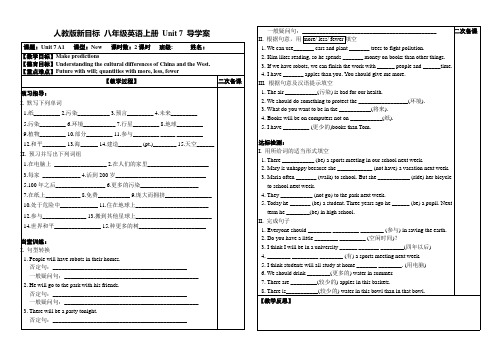
人教版新目标八年级英语上册Unit 7 导学案课题:Unit 7 A1 课型:New 课时数:2课时班级: 姓名:【教学目标】Make predictions【德育目标】Understanding the cultural differences of China and the West.【重点难点】Future with will; quantities with more, less, fewer【教学过程】二次备课预习指导:I. 默写下列单词1.纸_________2.污染___________3.预言_________4.未来_________5.污染_________6.环境___________7.行星_________8.地球_________9.植物_________ 10.部分_________ 11.参与_________ _____ _________12.和平________ 13.海______ 14.建造________ (pt.)________ 15.天空______II. 预习并写出下列词组1.在电脑上__________________2.在人们的家里_____________________3.每家_____________4.活到200岁_______________________________5.100年之后_________________6.更多的污染____________________7.在纸上____________ 8.免费___________ 9.庞大而拥挤________________10.处于危险中_____________ 11.住在地球上_________________________12.参与_______________ 13.搬到其他星球上__________________________14.世界和平________________ 15.种更多的树_______________________当堂训练:I. 句型转换1. People will have robots in their homes.否定句:______________________________________________一般疑问句:______________________________________________2. He will go to the park with his friends.否定句:______________________________________________一般疑问句:______________________________________________3. There will be a party tonight.否定句:______________________________________________人教版新目标八年级英语上册Unit 7 导学案课题:Unit 7 A2 课型:New 课时数:2课时班级: 姓名:【教学目标】Make predictions【德育目标】Understanding the cultural differences of China and the West.【重点难点】Future with will; quantities with more, less, fewer【教学过程】二次备课预习指导:I. 背Grammar focus 并写出下列句子1.城市将会是什么样子?城市将受到更多污染并且有更少的树。
2020年人教版(八年级下册)英语导学案:Unit 7(第3课时)Section B(2a-2e)
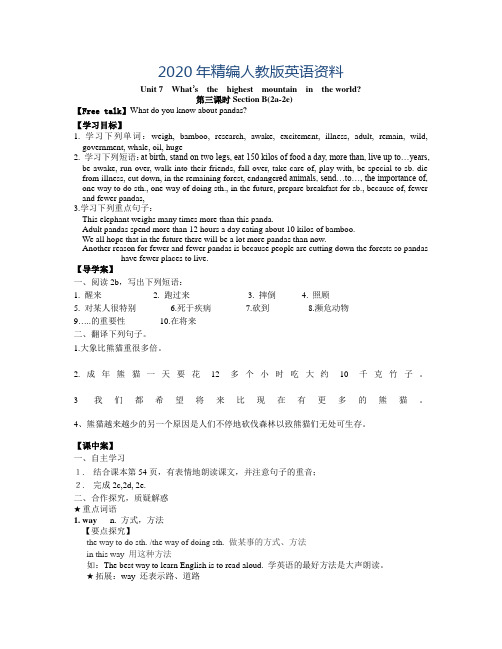
2020年精编人教版英语资料Unit 7 What’s the highest mountain in the world?第三课时Section B(2a-2e)【Free talk】What do you know about pandas?【学习目标】1. 学习下列单词:weigh, bamboo, research, awake, excitement, illness, adult, remain, wild, government, whale, oil, huge2. 学习下列短语:at birth, stand on two legs, eat 150 kilos of food a day, more than, live up to…years, be awake, run over, walk into their friends, fall over, take care of, play with, be special to sb. die from illness, cut down, in the remaining forest, endanger ed animals, send…to…, the importance of, one way to do sth., one way of doing sth., in the future, prepare breakfast for sb., because of, fewer and fewer pandas,3.学习下列重点句子:This elephant weighs many times more than this panda.Adult pandas spend more than 12 hours a day eating about 10 kilos of bamboo.We all hope that in the future there will be a lot more pandas than now.Another reason for fewer and fewer pandas is because people are cutting down the forests so pandas have fewer places to live.【导学案】一、阅读2b,写出下列短语:1. 醒来__________2. 跑过来_____________3. 摔倒______4. 照顾___5. 对某人很特别________6.死于疾病________7.砍到_________8.濒危动物_________9…..的重要性________10.在将来________二、翻译下列句子。
人教版初二八年级上册英语Unit 7第七单元导学案教学案讲学稿
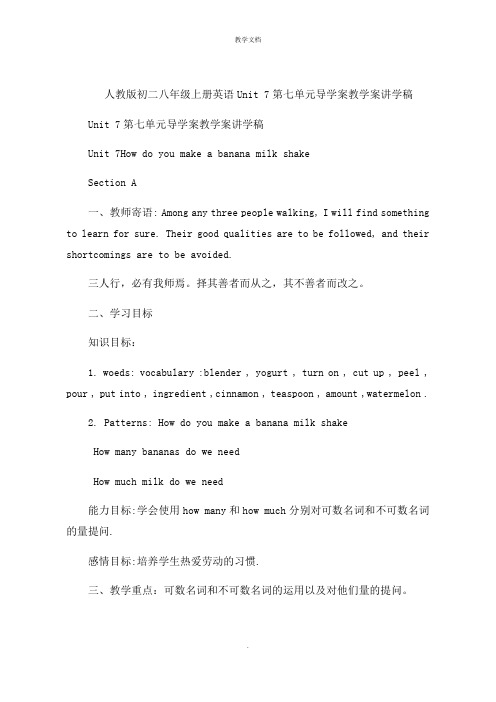
人教版初二八年级上册英语Unit 7第七单元导学案教学案讲学稿Unit 7第七单元导学案教学案讲学稿Unit 7How do you make a banana milk shakeSection A一、教师寄语: Among any three people walking, I will find something to learn for sure. Their good qualities are to be followed, and their shortcomings are to be avoided.三人行,必有我师焉。
择其善者而从之,其不善者而改之。
二、学习目标知识目标:1. woeds: vocabulary :blender , yogurt , turn on , cut up , peel , pour , put into , ingredient ,cinnamon , teaspoon , amount ,watermelon .2. Patterns: How do you make a banana milk shakeHow many bananas do we needHow much milk do we need能力目标:学会使用how many和how much分别对可数名词和不可数名词的量提问.感情目标:培养学生热爱劳动的习惯.三、教学重点:可数名词和不可数名词的运用以及对他们量的提问。
教学难点.:如何描述过程。
四、学习过程〔一〕预习导学及自测从方框中选择适当的单词完成以下句子salt, turkey, check, roll, sauce1. Finally ____ the pancake.2. ____ looks like sugar.3. How many teaspoons of ____ do you need4. Did you ____your answers5. Put some ____ slices on the sandwich.〔二〕自主学习X Page 41 , 1a .Look at the picture .What can you seePoint out the blank likes in the picture .Ss twrite the names of the actions .Choose the correct words .Ss fill in the blanks on their own .Check the answers .X Page 41, 1b .Point out the actions in the picture and the list of actions in activity 1b .Play the recording and check the answers .X Page 42 , 2a .Point out the two columns in the chart and read the headings .Say , Maria and Katie are talking about making fruit salad .Listen carefully .What do they need Write the names of the ingredients .Play the recording and check the answers .X Page 42 , 2b .Listen again .This time listen to the amout of each ingredient the girls talk about .Write the name of each ingredient next to the correct amount .A student reads the amounts in the first column .Play the recording .Ss work .Check the answers .X Page 43 , 3a .Look at the picture and answer what the boy and girl are doing .Read the four words at the beginning of the activity .Answer the number the words to show the order .Read the conversation .And complete it .〔三〕合作探究X Page 41 , 1c .Point out the instructions in activity 1b .And talk with a partner .X Page 42 ,2c .Read the instruction for the activity .Point to the sample conversation .Two students read the questions and answers to the class .Ss work in pairs .Some pairs to present their conversations .〔四〕拓展创新Grammar focus .Review the grammar box .Ss to say the questions and answers .Write the words countable and uncountable on the Bb .One or two students explain what these words meanPay attention to the verb , there are imperative sentences .Students say sentences like these .X Page 43 , 3b .Point out the picture .Ss tell what is happening in each picture. Review the words :popcorn , popcorn popper ,salt , bowl .A student read the directions in the box .Ss work with partner ,then one or two students tell the class how to make popcorn .I want three bottles of milk.我想要三瓶牛奶。
八年级英语上册Unit7导学案
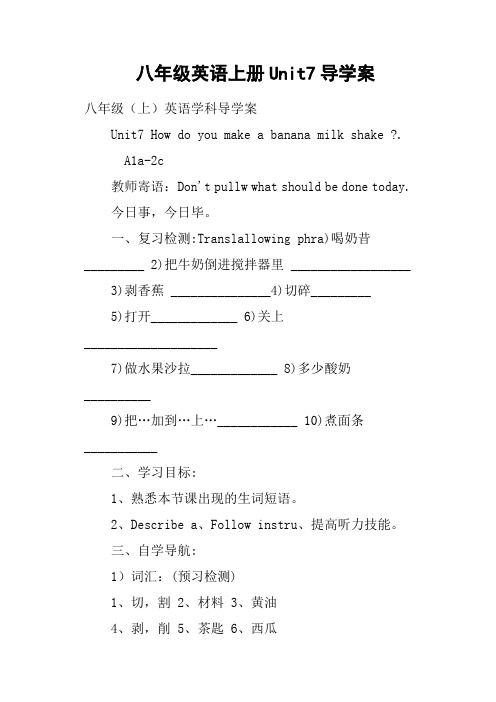
八年级英语上册Unit7导学案八年级(上)英语学科导学案Unit7 How do you make a banana milk shake ?.A1a-2c教师寄语:Don't pullw what should be done today.今日事,今日毕。
一、复习检测:Translallowing phra)喝奶昔_________ 2)把牛奶倒进搅拌器里 __________________ 3)剥香蕉 _______________4)切碎_________5)打开_____________ 6)关上____________________7)做水果沙拉_____________ 8)多少酸奶__________9)把…加到…上…____________ 10)煮面条___________二、学习目标:1、熟悉本节课出现的生词短语。
2、Describe a、Follow instru、提高听力技能。
三、自学导航:1)词汇:(预习检测)1、切,割2、材料3、黄油4、剥,削5、茶匙6、西瓜2)阅读听力原文,理解大意,为课上练习听力做好准备。
四、展示交流:1、小组交流自学导航的自学成果,教师巡回指导。
(建议学生板书)2、小组交流如何制作香蕉奶昔。
A:How do you make a banana milk shake?B:.Peel the bananas…知识点:短语:1)把水果放进碗里 2)两勺蜂蜜3)混合4)把材料放到面条上5)打开棒花机 6)倒入7)一茶杯酸奶五、学海探究:实际练习做香蕉奶昔六、写作练习。
你怎么做香蕉奶昔?请你写出过程。
六、中考连接:(2009河北)____ thos e lights,please. Don’t use so much energy.A. Take offB. PuTurn off D. Tu七、反思总结:我的收获:__________________________英语学科导学案Unit 7 How do you make a banana milk shake?(B)一、学习目标:1Describe a2Follow instru二、重点难点:1、a2、a…3、taste deliciou、enough to dugh to d、need to d三、知识链接:1、Puato the bread.A.in B、on C、2、Finally, put two of reluA、teaspoon B、tea、tea、We need three (西红柿)4、Would you please (help)me wglish?5、He is old enough (go) l.6、Here’s a(介词)a great turkey sandw、Can you give me (另一个) apple?8、He ate two (三明治).四、基础知识:1、another的用法2、a、a…4、taste+adj5、...enough to do6、Would you please+V原…?Would you please not do sth…?two slbread7、slice 片l(slices) put on alice of breadaspoon ①a teabu茶匙②two teal(teaspoons)③put two tealu五、能力训练:Writing:1、Suandw超级鸡肉三明治2、Aa great turkey sandw、How to eat Beijing Duck作业布置:1、作文:How to eat Beijing Duck2、背诵:How to mauandwich。
人教版八年级上册unit7前三个课时课时导学案-word文档资料

Unit 7 Will people have robots? Section A1(1a~2d)【学习目标】知识与技能:1.熟练掌握词汇:will, robot, everything, paper, use, fewer, less, pollution2. 熟练掌握以下句型:(1) There will be more pollution.(2) A: Will there be fewer trees? B: Yes, there will. /No, there won’t.(3)Kids will study at home on computers.(4)People will live to be 200 years old.(5)Really?I don’t think so过程与方法:1. 学会运用there be句型的一般将来时和will 构成的一般将来时态对未来进行预2. 学会运用“more, fewer, less”比较多少。
情感态度与价值观:学会积极的心态去面对未来的变化。
注意保护环境、爱护地球。
【使用说明与学习指导】1.限时完成预习案并及时请英语组长检查签名。
2.将预习中不明白的地方用红笔标出,在课上解决。
【预习案】预习一:汉译英.1.纸;纸张________________________2.污染;污染物________________________3.预言;预测_____________________4.将来;未来________________________5.污染________________________6.环境________________________7.行星________________________ 8.种植________________________9.部分________________________ 10.和平________________________预习二:预习课本P49-P50,翻译下列短语。
八年级英语上册unit7导学案
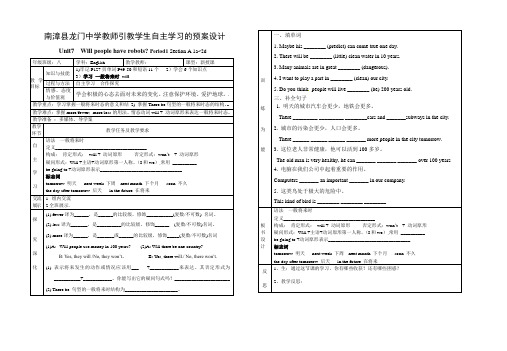
南漳县龙门中学教师引教学生自主学习的预案设计Unit7 Will people have robots? Period1 Section A 1a~2d年级班级:八学科:English 教学教师:课型:新授课教学目标知识与技能1)牢记P127页单词P49-50和短语11个2)学会6个知识点3)学习一般将来时will过程与方法自主学习合作探究情感、态度与价值观学会积极的心态去面对未来的变化。
注意保护环境、爱护地球。
.教学重点:学习掌握一般将来时态的意义和结2) 掌握There be句型的一般将来时态的结构。
教学难点:掌握more/fewer;more/less的用法,情态动词will + 动词原形来表达一般将来时态。
教学准备:多媒体、导学案教学环节教学任务及教学要求自主学习语法一般将来时定义______________________________________构成:肯定形式:will + 动词原形否定形式:won’t + 动词原形疑问形式:Will +主语+动词原形第一人称,(I和we),常用__________ be going to +动词原形表示__________________________________标志词tomorrow 明天next week 下周next month 下个月soon 不久the day after tomorrow 后天in the future 在将来交流展示1.组内交流. 2全班展示.探究深化(1) fewer译为______,是______的比较级,修饰___________(复数/不可数) 名词。
(2) less译为_______,是__________的比较级,修饰______ (复数/不可数)名词。
(3) more译为______,是_______或______的比较级,修饰_____(复数/不可数)名词(1)A:Will people use money in 100 years? (2)A: Will there be one country?B: Yes, they will /No, they won’t。
人教版英语八年级上册导学案:Unit 7 第3课时
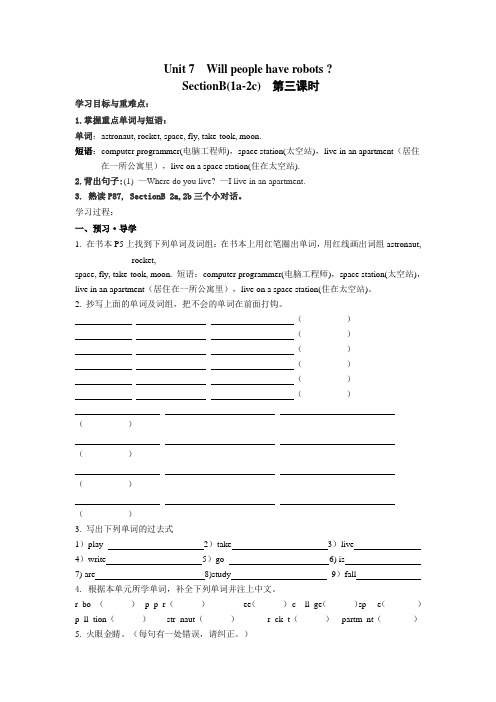
Unit 7 Will people have robots ?SectionB(1a-2c) 第三课时学习目标与重难点:1.掌握重点单词与短语:单词:astronaut, rocket, space, fly, take-took, moon.短语:computer programmer(电脑工程师),space station(太空站),live in an apartment(居住在一所公寓里),live on a space station(住在太空站).2.背出句子:(1) —Where do you live? —I live in an apartment.3. 熟读P87, SectionB 2a,2b三个小对话。
学习过程:一、预习·导学1. 在书本P5上找到下列单词及词组:在书本上用红笔圈出单词,用红线画出词组astronaut,rocket,space, fly, take-took, moon. 短语:computer programmer(电脑工程师),space station(太空站),live in an apartment(居住在一所公寓里),live on a space station(住在太空站)。
2. 抄写上面的单词及词组,把不会的单词在前面打钩。
()()()()()()()()()()3. 写出下列单词的过去式1)play 2)take 3)live4)write 5)go 6) is7) are 8)study9)fall4. 根据本单元所学单词,补全下列单词并注上中文。
r_bo_()p_p_r()_ _ee()c__ll_ge()sp_ _e()p_ll_tion()_str_naut()r_ck_t()_partm_nt()5. 火眼金睛。
(每句有一处错误,请纠正。
)1)There will have less paper money.2)I will spend fewer time on homework.3)What will the future like?4)What will you do after 10 years?5)He lives in a apartment but I never go there.二、预习·疑问(通过认真预习,请你写下疑惑摘要,在预习准备课上与组员交流)星级评定(由学习组长评定,对完成预习任务并积极讨论疑惑的组员给予一颗星)三、学习·研讨(根据教学目标与学生共同完成教学过程,同时解决学生的疑问)活动(1):复习导入新课。
初二八年级上册英语人教版Unit 7 Section B 01 导学案

Unit 7 Will people have robots?Period Three (Section B 1a—2e)一、学习目标1. Key Words: astronaut\rocket\apartment\programmer\space station等2. Key sentences:. live in an apartment fly rockets to the moonlive on a space station a computer programmer二、教学重难点:本节课的新单词及句型能正确运用一般将来时表达个人想法三、学具准备:四、自主预习:1、自主解惑(独学)(1)、个人自读,记忆本课时单词课后单词表P128相关的本课时单词(2)、朗读1a中的词组并熟记这些词组,完成下面的汉英互译:Astronaut_____________火箭_______________房子________________________ space station ______________公寓______________火车_____________________ programmer_______________________-(3)、并将1a中的单词准确的归类;看谁还能说得更多,然后将他们写下来,完成1b。
Jobs:_______________________________________________________________ Transportation:______________________________________________________ Places to live:________________________________________________________ (4)、查阅1c、1d听力材料,完成相应听力任务。
完成下列填空,对自己不理解的标记出来,以备学习交流。
人教版英语八年级上册 Unit7 Period3精品导学案
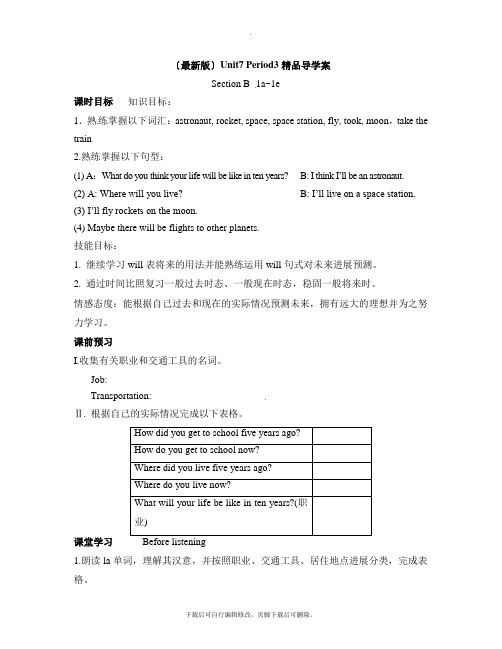
〔最新版〕Unit7 Period3精品导学案Section B 1a~1e课时目标知识目标:1.熟练掌握以下词汇:astronaut, rocket, space, space station, fly, took, moon,take the train2.熟练掌握以下句型:(1) A:What do you think your life will be like in ten years? B: I think I’ll be an astronaut.(2) A: Where will you live? B: I’ll live on a space station.(3) I’ll fly rockets on the moon.(4) Maybe there will be flights to other planets.技能目标:1. 继续学习will表将来的用法并能熟练运用will句式对未来进展预测。
2. 通过时间比照复习一般过去时态、一般现在时态,稳固一般将来时。
情感态度:能根据自己过去和现在的实际情况预测未来,拥有远大的理想并为之努力学习。
课前预习I.收集有关职业和交通工具的名词。
Job:_________________________________________________________________ Transportation:________________________________________________________ Ⅱ. 根据自己的实际情况完成以下表格。
How did you get to school five years ago?How do you get to school now?Where did you live five years ago?Where do you live now?What will your life be like in ten years?(职业)课堂学习1.朗读la单词,理解其汉意,并按照职业、交通工具、居住地点进展分类,完成表格。
八年级英语上册8导学案(无答案)(新版)人教新目标版
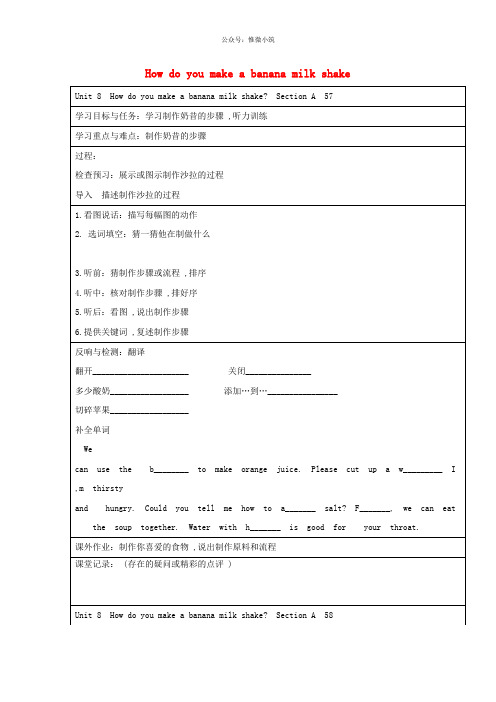
2. ________________________________(多少盐) do we need ?
3.___________________________________(多少苹果) do you need ?
3.小组合作:看答案 ,猜问题 .老师出示答案 ,大家写问题 .
4.看图说制作爆米花的步骤 ,排序 ,与图片配对
5.游戏:老师说步骤 ,学生描述方法 ,描述正确的一组可以向前走一步 ,看谁先到达目的地
6.分组讨论课本中提到的四种活动 (选择同一种活动的为一组 ) ,How to make/do it ?
4 .Look! The mountain is white. It ,s c_______ with snow.
5 .Wow! The hall is f_______ with boxes.
6 .首||先请用手捂上眼睛 .
First_______your eyes______ your hands.
A. two glasses of water B. two water
C. two glass of waters D .two glasses of waters
课外作业:讨论制作三明治的原料与方法
课堂记录: (存在的疑问或精彩的点评 )
Unit 8 How do you make a banana milk shake? Section B 60
1.看图说话:描写每幅图的动作
2.选词填空:猜一猜他在制做什么
3.听前:猜制作步骤或流程 ,排序
4.听中:核对制作步骤 ,排好序
5.听后:看图 ,说出制作步骤
八年级英语上Unit7导学案

主备人覃喜梅备课组审核_______审核人______ ______班_______小组姓名:_______ 宜州市第二中学八年级英语(上)导学案课题Unit 7 Will people have robots?Section A (1a—1c) Period 1 听说课【学习目标】1.记住重点词汇和短语:paper ; in their homes ; in 100 years;on computer; on paper2. 通过学习,能自如运用will 构成的一般将来时态的肯定句、否定句、一般疑问句及答语。
(重点)3. 做预言,用will 来讨论未来发生的事情。
(难点)【学习流程一】预习交流(10分钟)一、独学:1. 熟读记住以上目标词汇。
2. 完成课本P49 1a部分。
二、预习反馈:翻译下列句子。
1. 人们在自己家里将有机器人。
People ____ ____ robots ___ their ____.2. 人们将不用钱了。
一切都将是免费的。
People ____ ____ money. Everything will ____ _____.3. 孩子们将不用去上学。
他们将在家里用电脑学习。
Kids ____ ____ go to school. They’ll study at home _______ _______.4. 书将仅仅出现在电脑上,而不是印在纸上。
Books ____ only _____ on computers, not _____ _____.5. 将只有一个国家。
_____ _____ ____ ____ one country.6. 人们将活到200岁。
People ____ ____ ____ ____ 200 years old.三、对学或群学:与对子或伙伴交流独学的结果。
【学习流程二】展示点评(25分钟)一、预习展示: 1. 检查全班同学对词汇的掌握情况。
- 1、下载文档前请自行甄别文档内容的完整性,平台不提供额外的编辑、内容补充、找答案等附加服务。
- 2、"仅部分预览"的文档,不可在线预览部分如存在完整性等问题,可反馈申请退款(可完整预览的文档不适用该条件!)。
- 3、如文档侵犯您的权益,请联系客服反馈,我们会尽快为您处理(人工客服工作时间:9:00-18:30)。
Unit 7 Will people have robots Section B(第三课时)导学案总第 __ 课时
【学习目标】
1.掌握单词:astronant\rocket\apartment\programmer\space station等
2.掌握句型:.live in an apartment fly rockets to the moon
live on a space station a computer programm er
【学习重难点】
本节课的新单词及句型。
能正确运用一般将来时表达个人想法。
【课前导学】检查课前预习情况 :
翻译短语:
1.想成为一名宇航员
2.住在一所公寓里
3.住在太空里
4.住在太空站
5.在街道对面
6.在乡下一所房子里
7.乘火车上学③
8.乘火箭飞往月球
9.在这儿附近
10.没有住的空间
【课堂导学】
I、展示交流
1.让学生用“more”, “less” 和“fewer”这三个词描述将来的生活。
2.学习新单词,完成1a 的学习,并将1a中的单词准确的归类;看谁还能说得更多,然后将他们写下来。
3听录音,完成1c的听力,教师核对答案,展示答案;
4.再听一遍,完成1d 的听力,选择正确的动词填空。
教师核对答案,让学生齐声朗读这些句子。
Ⅱ、合作交流
Group work: According to 1c and 1d,talk about Joe’s life now,10years ago and 10 years from now.
拓展并组织三组对话
What was Joe ten years ago?__________________________________
What did he play?__________________________________
What did he have?__________________________________
__________________________________? He is a college student.
__________________________________? He plays the guitar.
__________________________________?He has a dog.
What will Joe be in ten years?__________________________
What will he play? ________________________________
What will he have? ________________________________
【达标测评】
一、用括号中所给单词的适当形式填空:
1. There (be) fewer cars in 100 years.
2. She (be) 20 next month.
3. the Browns (go) to Shanghai for vacation? – Yes, they will.
4 There will be (few) birds in the future than now.
5.Kids (study) at home on computers in 100 years.
6.I _____ (be) a little kid ten years ago. I _____ (be) a middle school student now.
I _____(be) a college student in five years.
7. His sister always plays a part in ______ (save) the animals.
8. We should plant ______ (many)trees than before.
9. Now the ______ (pollute) is very serious.
二、单项选择:
1.—In 2050,what will the world's population be?
—I think cities will be really big and crowded becaus e there will be a lot______ people. A.much B.more C.many D.less
2. What do you think Sally will be______10 years? A.after B.behind C.later D.in
3.“There______a meeting next Monday.”means “They______a meeting next Monday.”
A.will be;will be B.will have;will have
C.will be;will have D.will have;will be
4.____ will the weather _ like tomorrow? A. What, / B. What, be C. How, be D. How, /
三、翻译句子:
1.一百年后人们将住在空间站。
People______ ______ ______a space station______100 years.
2.将来一切都将是免费的。
______will______ ______ ______ ______ ______.
3.我们家乡将有一个火车站。
______ ______ ______a railway station in our hometown.
4.你十年后的生活将会是什么样?
What______your life______ ______in ten years?
5.你多久能完成这份工作?______ ______will you finish the work?
6.我相信我们能做到这一点。
I believe We’ll ____ ______ _____ do this.
7.他长大了打算当一名宇航员。
_____________________________________________________
8.明天的天气怎么样?晴天。
_______________________________________________________
9.我住在这儿街道对过的一所公寓里。
_______________________________________________
10.你住在哪里?我住在乡下一间房子里。
____________________________________________ 编号:_____ 时间:班级小组姓名
小组评价: 教师评价编者:___ 初审:复审:______。
